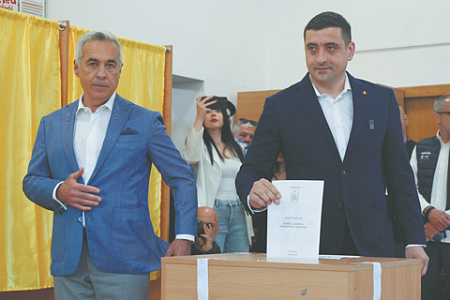
The first round of the Romanian presidential election, the results of which were announced on Monday, May 5, did not bring the most pleasant result for the authorities of this country. Their candidate, the representative of the ruling left-liberal coalition, Crin Antonescu, lost, and the leader of the far-right Alliance for the Unification of Romanians, George Simion, whom he considered the main opponent, reached the second round. Now all the hope of the opponents of the radicals is on Bucharest Mayor Nicusor Dana. Or the fact that the results of the presidential election, like six months ago, will be canceled.
It is very likely that Romania will soon be led by a leader of the same type as Hungarian Prime Minister Viktor Orban and Slovak Prime Minister Robert Fico: a euroskeptic, an opponent of Ukraine, sympathetic to Vladimir Putin and Donald Trump. This is Simion, who scored 40.94% of the votes in the first round. His closest pursuer, Dan, who went to the polls as an independent candidate, received much less: 20.99%. Until Monday, when 99% of the votes were counted, it was unclear who would be Simion’s opponent in the second round, the mayor of Bucharest or Antonescu. The latter was highly desired by the ruling coalition of the Social Democratic and National Liberal Parties, and especially by Prime Minister Marcel Ciolak. Former speaker of the upper house of Parliament Antonescu became the candidate of the ruling coalition after long negotiations and as a result of compromise. Cholaku took credit for finding just such a candidate in the end. Antonescu seemed to suit everyone in the Romanian establishment. But the voters were not satisfied.
Antonescu conceded a fraction of a percent to Dan and did not dispute this result. At a press conference after the election, he admitted defeat, but avoided answering the question of who he would call to vote for on May 18, when the second round would take place. Meanwhile, on social media, opponents of the far-right are wondering what would have happened if Dan and Antonescu had joined forces instead of competing. They agree that there would have been a second round anyway. In total, Dan and Antonescu scored about the same amount as Simion, that is, less than 50% needed to win the first round. It turns out that the forces of opponents and supporters of the far-right in the country are approximately equal.
This discovery nullifies the optimistic assumptions that were made in November, when the little-known Calin Georgescu unexpectedly entered the second round of the presidential election. He, also an ultra-rightist, was considered just a spoiler by Simion, designed to cut off some of the too radical voters, but unexpectedly he won. A number of political scientists considered this either an accident or, indeed, a consequence of Russia’s machinations: recall that the Romanian Constitutional Court annulled the results of the November elections, allegedly because Georgescu was campaigned for from abroad through fake Internet accounts. Now it is clearly visible that there is no accident. Georgescu, against whom a criminal case was opened, was not allowed to participate in the May elections, but he actively campaigned for Simion. It worked. So winning the first round is their joint victory.
It became obvious that there was a big demand in Romanian society for “their own Trump” – some kind of anti-systemic candidate who, if not changing everything for the better, would at least frighten the ruling elite, forcing them to think more about the interests of the people rather than their own well-being. Simion and Georgescu both like the comparison with the American president. It is difficult to say how true it is. Simion is generally credited with many things, such as pro-Russian views. And this is despite the fact that he called Russia “the main threat to Romania” not only in modern times, but also over the past 200 years. Simion is a supporter of the unification of Romania and Moldova and, accordingly, advocates the withdrawal of Russian troops from Transnistria. All this is surprisingly combined in his views with sympathy for the Russian leader and a negative attitude towards helping Ukraine. Simion strongly opposes sending Romanian troops as part of the “coalition of the willing” to Ukrainian territory. At the same time, unlike Georgescu, he did not advocate the country’s withdrawal from the EU or NATO. In general, Simion is often compared to Orban in his views. This comparison is probably justified.
If Simion wins the second round, there is a high probability that a confrontation between the branches of government will begin in the country. Romania is a presidential and parliamentary republic. Both the far-right president and the parliament with its left-liberal majority will have comparable powers. Many people in Romania do not want this, which means that the struggle for victory in the May 18 elections will be tough. It will become even tougher if the voting results are canceled again.
In the meantime, Ciolaku said that his Social Democratic Party is considering the possibility of withdrawing from the parliamentary majority coalition. If this happens, parliamentary elections will soon be held in the country. According to polls, the ultra-right has less chance of winning them than in the presidential elections.
